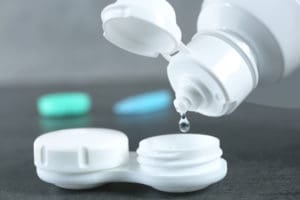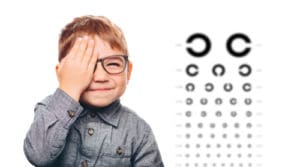Further Reading
Things You Can and Can’t Do While Wearing Contacts
Home / Understanding Contacts /
Last Updated:
Table of Contents
Contact lenses seem to grow increasingly popular, especially as technology makes them more able to correct vision, but they do come with rules on how to wear them – and when not to.
Put another way, there are more wrong ways to wear contacts than there are to wear prescription eyeglasses.
According to the Centers for Disease Control and Prevention (CDC), an estimated 45 million Americans wear contacts. But from the dangers of water, dirt and physical activity, contacts also come with guidelines for everyday wear.
Most wearers understand to take them out before taking a nap or going to bed at night. There are also limitations for children. And contacts come with a much more regimented care routine.
The Downside of Contact Lenses
Preferred by many for their subtle design compared to glasses, contact lenses have many advantages. Doctors emphasize that they must be used carefully.
Contact lenses are considered by many to be more convenient than glasses. They can be put in the eyes and largely left alone for the majority of the day. While they are indeed more convenient than glasses in some ways, it is very important to take care of contact lenses properly.
You deserve clear vision. We can help.
With 135+ locations and over 2.5 million procedures performed, our board-certified eye surgeons deliver results you can trust. Your journey to better vision starts here.
Glasses can sometimes be fragile, but if they are mishandled, they simply need to be replaced. The lenses of most modern glasses do not shatter, so there is little chance for them to hurt the eyes.
Misused contact lenses can sometimes cause much more serious harm to a user.
Things to Avoid While Wearing Contacts
There are several behaviors that should be avoided when wearing contacts.
One that most people are aware of is sleeping. Sleeping with contacts can generally cause a host of problems. Most contact lenses come with a wearing schedule, where you are only supposed to wear the lenses for a set amount of time.
Overwearing lenses has an increased risk of complications, such as infection. It is very important to regularly and properly clean your lenses and give your eyes a break. If you are unsure how to properly clean and maintain your lenses, talk with your doctor for clarification.

Proper cleaning is important. Some people make the mistake of using tap water to clean their lenses. Most water is not totally germ-free. Using tap water to clean lenses, or swimming (especially in lakes, ponds, or the ocean), while wearing contact lenses can expose your eyes to dangerous and irritating germs.
Avoid getting your contact lenses wet at all, barring during the cleaning process where you will use saline solution. If your lenses do get wet, it may be possible to clean them, but the safest measure is to throw them away and get new ones.
Moving and touching your contact lenses too much can cause problems, both due to bacteria and because it risks pressing them into the eye. You should not rub your eyes when wearing contacts. You should either not wear contacts or wear them under protective goggles when engaging in physical activity like contact sports.
Wearing contact lenses while ill, experiencing allergies, or dealing with any kind of eye symptoms is a bad idea. At best, they can irritate your eyes further. At worst, you may expose your contact lenses to bacteria that you are then putting directly on your eyes.
If you’re unsure whether you should use contacts, it is generally best to be safe and avoid them until you feel better.
Activities During Which You Shouldn’t Wear Contacts
Although contact lenses are more popular than eyeglasses and are considered by most wearers to be more convenient, there are some places and events in which wearing them is risky for your health. For starters, the U.S. Food and Drug Administration (FDA) recommends not exposing contacts to any type of water – and that’s no small item. Bathing, showering and swimming top the list of not-to-dos.
The outdoors also can present challenges for contact lens wearers.
Bathing and Showering
It’s important to keep contact lenses away from water. Water increases the risk of bacteria and other pathogens contaminating your lenses.
Lens contamination can cause serious eye infections. People who wear contacts have a higher risk of developing keratitis (inflammation of the cornea) caused by germs that enter the cornea. You can find these germs in various water sources, including tap water.
Exposure to water can also warp or causes the lenses to stick to your eye surface, potentially causing corneal scratches and abrasions. And yes, this means you should remove your contacts before bathing and showering.
Swimming
Swimming while wearing contacts is a terrible idea. Not only are there pathogens and bacteria in bodies of water both large and small, even controlled swimming areas are dangerous.
Pools, hot tubs and spas, whether indoors or out, need extensive chemical treatments to keep them safe for swimming. The chemicals, especially chlorine, can pump your eyes full of irritants. Sore, red eyes are just the beginning of the potential problems. Eye infections and corneal ulcers are on the more serious end of the spectrum.
Sleeping
Sleeping with your contacts in can also cause eye infections and corneal ulcers. In some cases, it can cause blindness.
Unless your eye doctor prescribes your contacts to be worn while sleeping, you should avoid wearing contact lenses overnight.
Sleeping in contacts is not recommended since they restrict the amount of oxygen and moisture your cornea receives. This impedes your cornea’s ability to fight infections.
Biking and Other Activities Prone to Dustiness
When biking, you should wear protective goggles or glasses if you insist on wearing contact lenses. Otherwise, experts recommend foregoing your contacts when engaged in activities likely to stir up dust. Dirt and dust from the tracks can get lodged in your contact lenses very easily.
Things You Shouldn’t Do When Wearing Contacts
- Do not rub your eyes
- Do not touch lenses with dirty hands
- Do not get into the water with your lenses on
- Do not keep contacts on irritated or painful eyes
- Do not wear lenses without cleaning them
- Do not allow makeup to come into contact with your lenses
- Do not put saliva on your lenses
- Do not wear someone else’s contacts
- Do not reuse disposable lenses
- Do not use eye drops while wearing contacts unless directed otherwise by your eye specialist
- Do not wear contact lenses for too long
- Do not wear contact lenses purchased without a prescription
You deserve clear vision. We can help.
With 135+ locations and over 2.5 million procedures performed, our board-certified eye surgeons deliver results you can trust. Your journey to better vision starts here.
Contact Lenses and Children

The FDA has a guide explaining the best practices when it comes to children and contacts. This guide advises that:
- Children not be started on contacts until the ages of 12 to 13.
- Maturity is a big element to proper contact use. Children of the same age may sometimes be able to handle very different levels of responsibility.
- Guardians watch their children’s contact lens routine carefully to spot any issues.
- Children be kept informed about proper contact care and hygiene.
The guide also emphasizes that children should not be allowed to use cheap contact lenses, often sold over the internet. Even zero-powered lenses need to be properly fitted to a person’s eyes for safety reasons. If a store does not require a prescription to buy their contacts, don’t buy them there.
Are Contact Lenses Too Limiting?
For people who are physically active, especially swimmers, contact lenses may seem very limiting.
Contact lenses are generally a perfectly manageable risk for the average user, as long as the proper way to use, clean, and store the lenses is understood.
Contacts are in many ways a double-edged sword. They are subtle, less bulky than glasses, and present an alternative for people who don’t like wearing glasses but need sight correction.
At the same time, they require a level of discipline and maintenance that glasses do not. Some people may find them more trouble than they are worth. Broadly speaking, glasses present fewer risks.
It is up to you if contact lenses will be too limiting for you. You can still work with them, go to most social gatherings, and otherwise live out a normal life within some basic parameters. If you believe you can maintain them, the choice is yours.
If you do not think you can keep up with the recommended routine, do not use contacts. An unhygienic or otherwise unsafe contact routine can put your eyes in more serious danger than most people realize.
You deserve clear vision. We can help.
With 135+ locations and over 2.5 million procedures performed, our board-certified eye surgeons deliver results you can trust. Your journey to better vision starts here.
References
- What to Know if Your Child Wants Contact Lenses. (August 2017). U.S. Food & Drug Administration (FDA).
- Healthy Contact Lens Wear and Care: Water & Contact Lenses. (June 2014). Centers for Disease Control and Prevention (CDC).
- Healthy Contact Lens Wear and Care: Other Complications. (June 2014). Centers for Disease Control and Prevention (CDC).
- Dos and Do nots of Contact Lens Wear. (January 2016). The University of Iowa.
- Healthy Contact Lens Wear and Care. Centers for Disease Control and Prevention.
- Wearing Contacts in the Pool. (July 2015). Health University of Utah.
- It is Okay to Shower with Contacts. (December 2020). Healthline Blog.
- Preventing Eye Damage from Contact Lenses. Cascadia Eye Blog.
- Contact Lens Safety. (May 2020). National Health Service UK.
- Dos and Don’ts for Contact Wearers. (August 2015). Everyday Health.
This content is for informational purposes only. It may have been reviewed by a licensed physician, but is not intended to serve as a substitute for professional medical advice. Always consult your healthcare provider with any health concerns. For more, read our Privacy Policy and Editorial Policy.